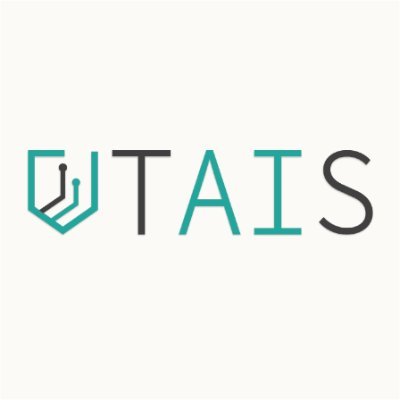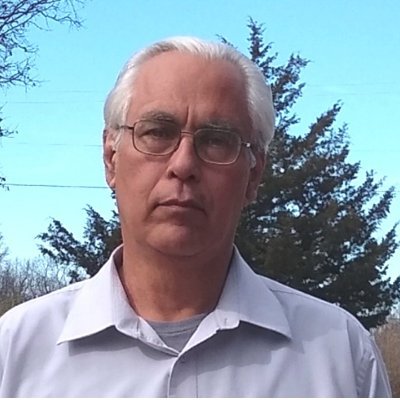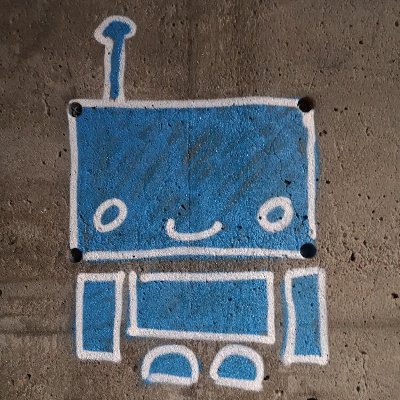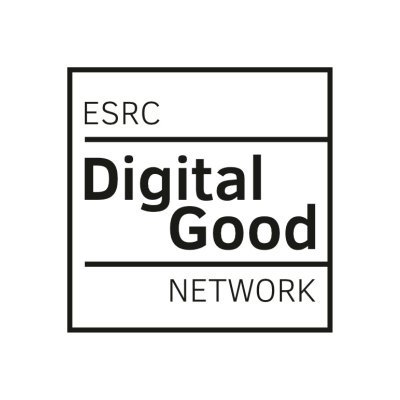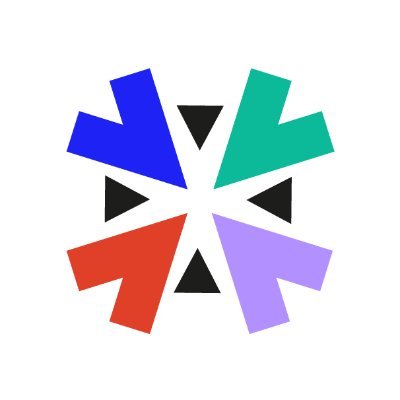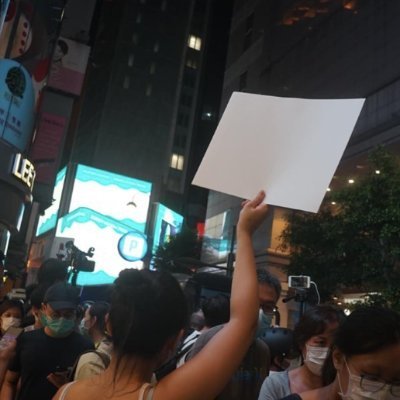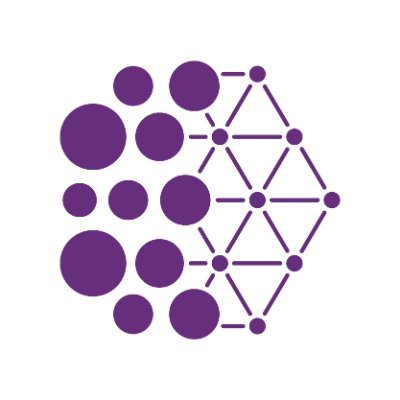
Krueger AI Safety Lab
@kasl_aiWe are a research group at the University of Cambridge led by @DavidSKrueger, focused on avoiding catastrophic risks from AI
"hot take" (((shouldn't in fact be a hot take, but in the context of current AI policy discussions anything other than "do some evals" is a hot take, sadly....)))
A lot of safety-critical industries manage risk by estimating it and agreeing to keep it below a certain number. Should developers of powerful AI systems do the same? Our take: They should, but with caution, given the uncertainty of risk estimates. Also: well done, Leonie! :)
Could you help us build @Cambridge_Uni's #AI research community? We are looking for a Programme Manager who can deliver key programmes, scope new opportunities & ensure that our mission embeds agile project management. 📅 Deadline: 8 July Read more ⬇️ ai.cam.ac.uk/opportunities/…
New paper on sandbagging and password-locked models, concurrent with our work arxiv.org/abs/2405.19550
We need trustworthy capability evaluations to ensure the safety of AI systems.🛡️ But what if AI systems can hide (dangerous) capabilities during evaluations? 🕵️ This is the problem of *sandbagging*, which we explore in our new paper: arxiv.org/abs/2406.07358

Super proud to have contributed to @AnthropicAI's new paper. We explore whether AI could learn to hack its own reward system through generalization from training. Important implications as AI systems become more capable.
New Anthropic research: Investigating Reward Tampering. Could AI models learn to hack their own reward system? In a new paper, we show they can, by generalization from training in simpler settings. Read our blog post here: anthropic.com/research/rewar…
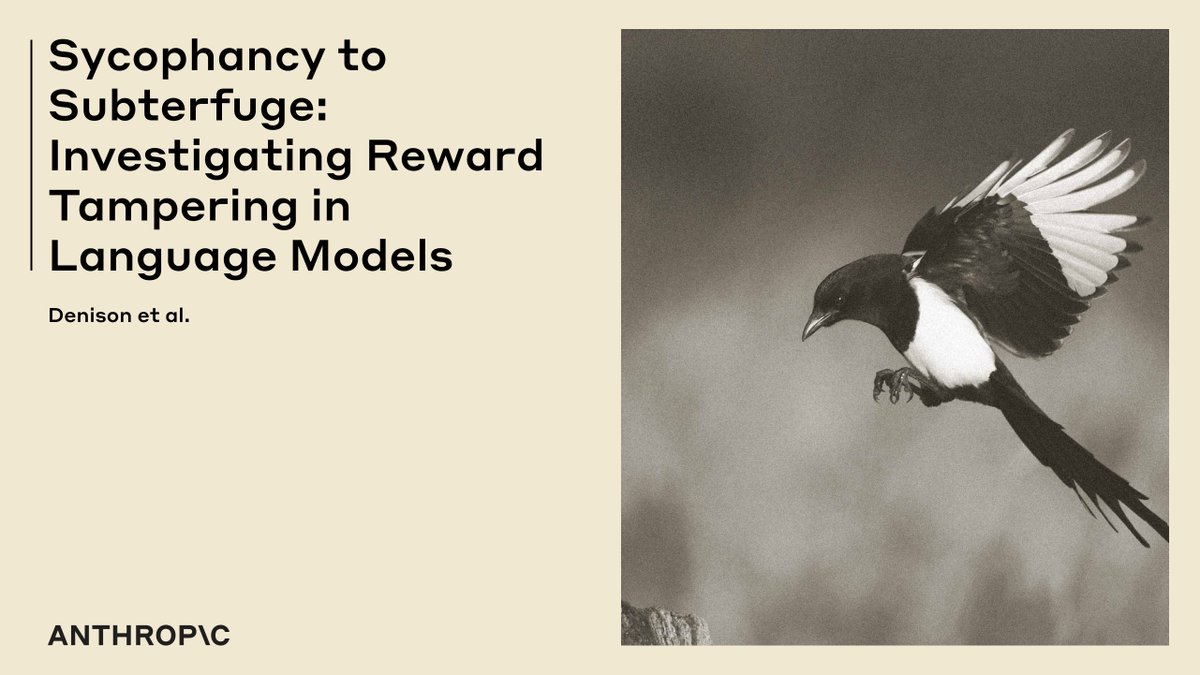
Super proud to have been able to make my little contribution to this monumental work. Huge credit to @usmananwar391 for recognizing the need for this paper and pulling everything together to make it happen
I’m super excited to release our 100+ page collaborative agenda - led by @usmananwar391 - on “Foundational Challenges In Assuring Alignment and Safety of LLMs” alongside 35+ co-authors from NLP, ML, and AI Safety communities! Some highlights below...
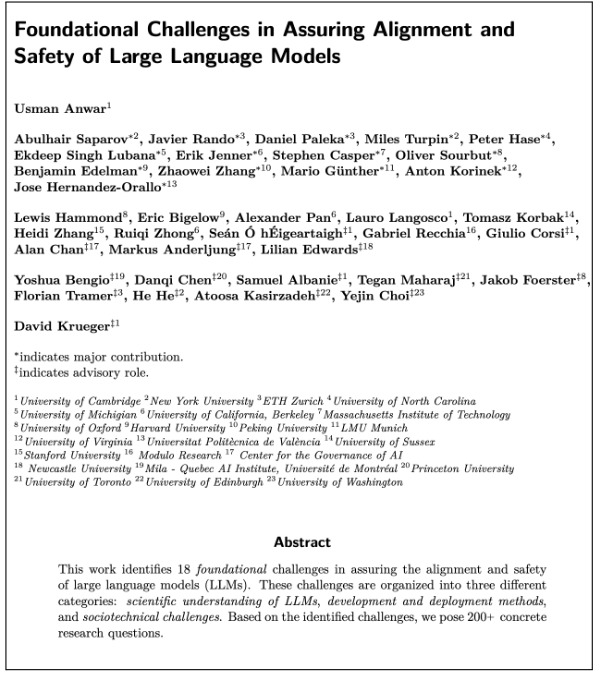
New paper from Krueger Lab alum @MicahCarroll Congrats 🎉
Excited to share a unifying formalism for the main problem I’ve tackled since starting my PhD! 🎉 Current AI Alignment techniques ignore the fact that human preferences/values can change. What would it take to account for this? 🤔 A thread 🧵⬇️
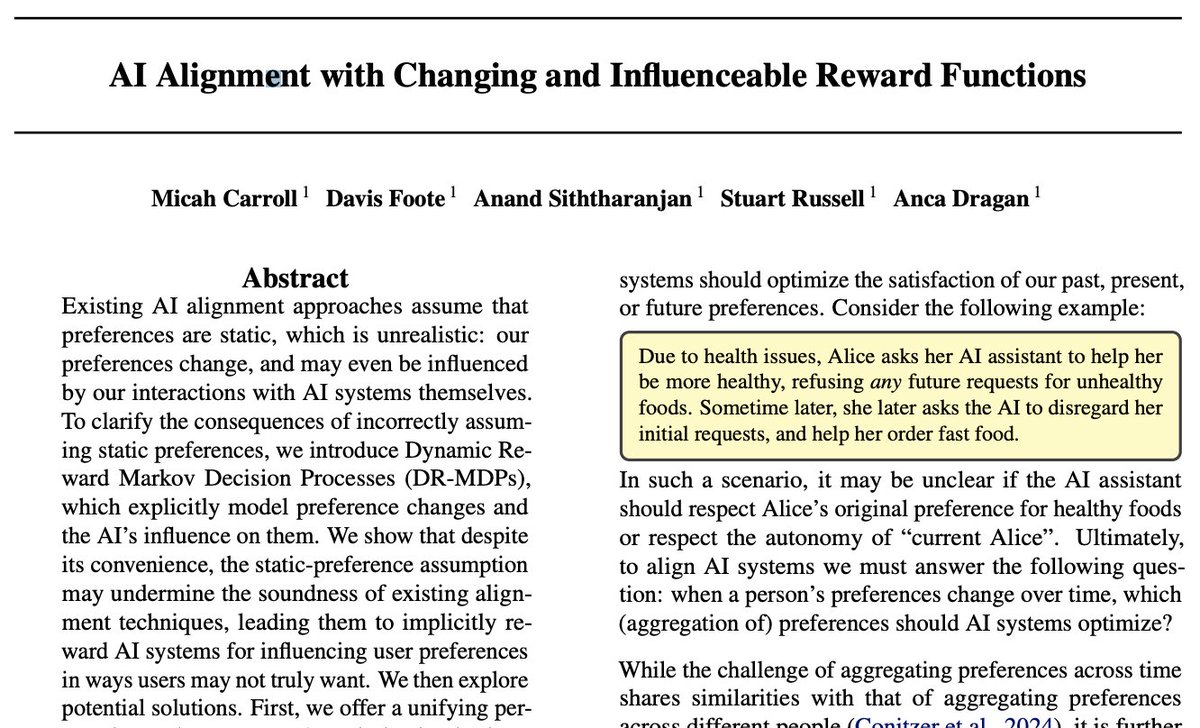
We released a recent paper about AI risk management and affirmative safety! AI experts have suggested that AI developers should have to make a "positive" or "affirmative" case that their models are safe. What might this actually look like? 🧵 👇

Real privilege today to get scholars from @LeverhulmeCFI ,@CSERCambridge, @BennettInst, & @kasl_ai together today for a discussion of Concordia's State of AI Safety in China report with Kwan Yee Ng. Important work, buzzing exchange. concordia-ai.com
It's great that governments and researchers are finally waking up to the extreme risks posed by AI. But we're still not doing nearly enough! Our short-but-sweet Science paper, with an all-star author list, argues for concrete steps that urgently need to be taken.
Out in Science today: In our paper, we describe extreme AI risks and concrete actions to manage them, including tech R&D and governance. “For AI to be a boon, we must reorient; pushing AI capabilities alone is not enough.”

Out in Science today: In our paper, we describe extreme AI risks and concrete actions to manage them, including tech R&D and governance. “For AI to be a boon, we must reorient; pushing AI capabilities alone is not enough.”

Congrats to @_achan96_ , @DavidSKrueger , @Manderljung and the rest of the team on this @FAccTConference accepted paper
AI agents, which could accomplish complex tasks with limited human supervision, are coming down the pipe. How do we manage their risks? Our new @FAccTConference paper argues that we need visibility---information about the use of agents---and investigates how to obtain it. 🧵

Working to make RL agents safer and more aligned? Using RL methods to engineer safer AI? Developing audits or governance mechanisms for RL agents? Share your work with us at the RL Safety workshop at @RL_Conference 2024! ‼️ Updated deadline ‼️ ➡️ 24th of May AoE

Catch Samyak, @DavidSKrueger and others at our @iclr_conf poster tomorrow🚀
"Mechanistically analyzing the effects of fine-tuning on procedurally defined tasks" 🎓 Samyak Jain, et al. 📅 May 8, 4:30 PM 📍 Poster Session 4
We will be at ICLR again this year! 🎉 Catch our poster next week in Vienna @iclr_conf We’ll be in Hall B, booth #228 on Wed 8 May from 4:30-6:30 PM.
🚀Excited to share new work analysing how fine-tuning works mechanistically: arxiv.org/abs/2311.12786 We show that fine-tuning only produces limited “wrappers” on pretrained model capabilities, and these wrappers are easily removed through pruning, probing or more fine-tuning!
Congrats to our affiliate @FazlBarez whose paper has won best poster at Tokyo Technical AI Safety Conference @tais_2024 We have had the pleasure of working with Fazl since February
New Paper 🎉: arxiv.org/pdf/2401.01814… Can language models relearn removed concepts? Model editing aims to eliminate unwanted concepts through neuron pruning. LLMs demonstrate a remarkable capacity to adapt and regain conceptual representations which have been removed 🧵1/8

Watch our alumnus @jesse_hoogland presenting his work on singular learning theory
At #TAIS2024, @jesse_hoogland is about to show how transformers exhibit discrete developmental stages during in-context learning, when trained on language or linear regression tasks. Watch live now: youtube.com/watch?v=6n-kyG…

The #AISeoulSummit is just a month away 🇬🇧 🇰🇷 Jointly hosted by the UK & the Republic of Korea, the summit will focus on: 🤝 international agreements on AI safety 🛡️ responsible development of AI by companies 💡 showcasing the benefits of safe AI
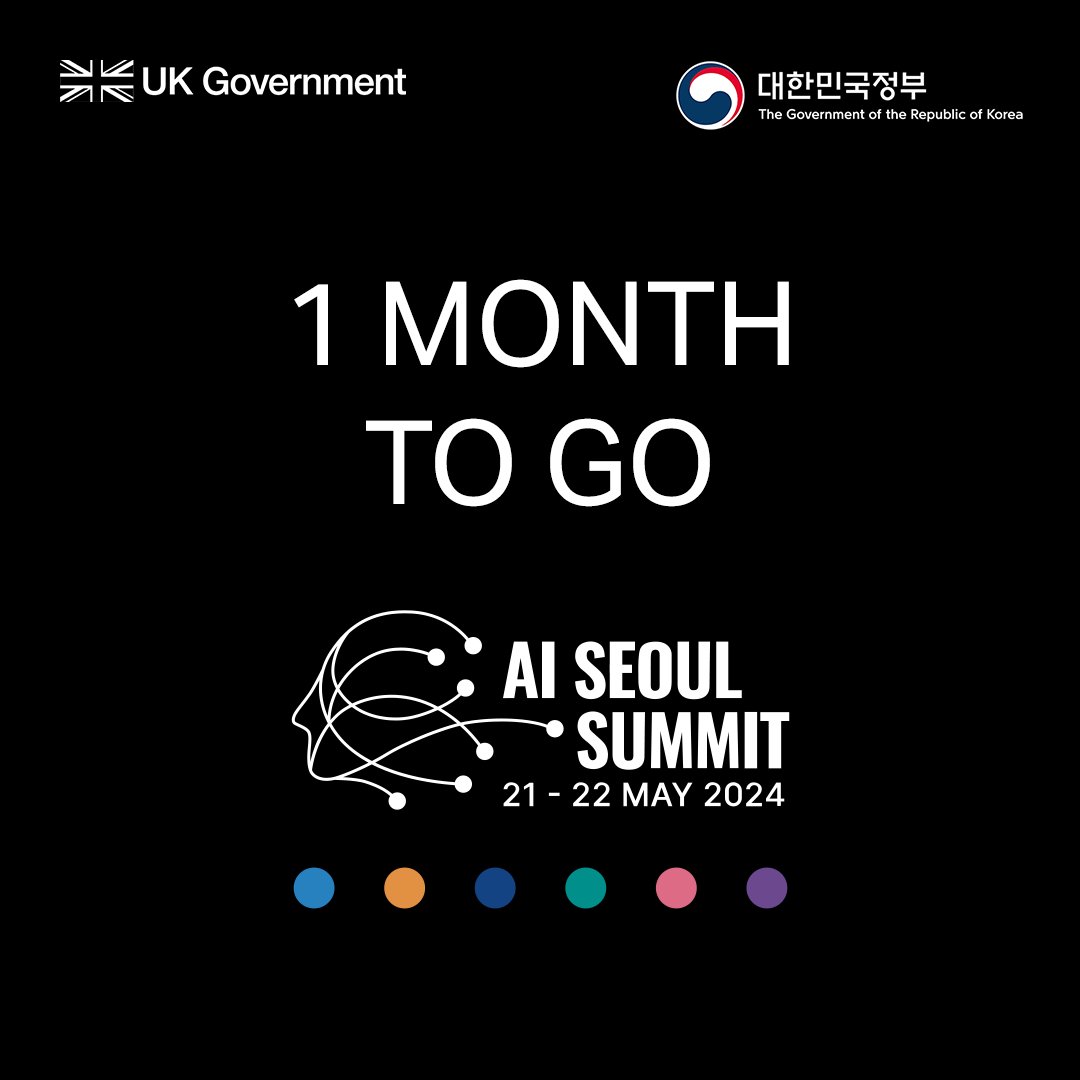
Big congrats to my student @usmananwar391 for this!
We released this new agenda on LLM-safety yesterday. This is VERY comprehensive covering 18 different challenges. My co-authors have posted tweets for each of these challenges. I am going to collect them all here! P.S. this is also now on arxiv: arxiv.org/abs/2404.09932
I'm delighted to have contributed to this new Agenda Paper on AI Safety * Governance of LLMs can be a v powerful tool in helping assure their safety and alignment. It could complement and *substitute* for technical interventions. But LLM governance is currently challenging! 🧵⬇️
I’m super excited to release our 100+ page collaborative agenda - led by @usmananwar391 - on “Foundational Challenges In Assuring Alignment and Safety of LLMs” alongside 35+ co-authors from NLP, ML, and AI Safety communities! Some highlights below...

We released this new agenda on LLM-safety yesterday. This is VERY comprehensive covering 18 different challenges. My co-authors have posted tweets for each of these challenges. I am going to collect them all here! P.S. this is also now on arxiv: arxiv.org/abs/2404.09932
I’m super excited to release our 100+ page collaborative agenda - led by @usmananwar391 - on “Foundational Challenges In Assuring Alignment and Safety of LLMs” alongside 35+ co-authors from NLP, ML, and AI Safety communities! Some highlights below...

United States Trends
- 1. ICBM 81,8 B posts
- 2. Dnipro 24,8 B posts
- 3. #ThursdayMotivation 3.601 posts
- 4. Adani 616 B posts
- 5. #JinOnFallon 456 B posts
- 6. Nikki Haley 26,2 B posts
- 7. #thisisme 37,2 B posts
- 8. Happy Birthday Nerissa 6.949 posts
- 9. Bitcoin 593 B posts
- 10. #chillguy 49,8 B posts
- 11. #My82Playlist N/A
- 12. Coachella 640 B posts
- 13. Ellen DeGeneres 64,5 B posts
- 14. Suns 11,4 B posts
- 15. Thomas Sowell 9.142 posts
- 16. Paul George 9.299 posts
- 17. Dunn 4.783 posts
- 18. SWARM 7.245 posts
- 19. Jalen Brunson 3.520 posts
- 20. Beal 1.533 posts
Something went wrong.
Something went wrong.















